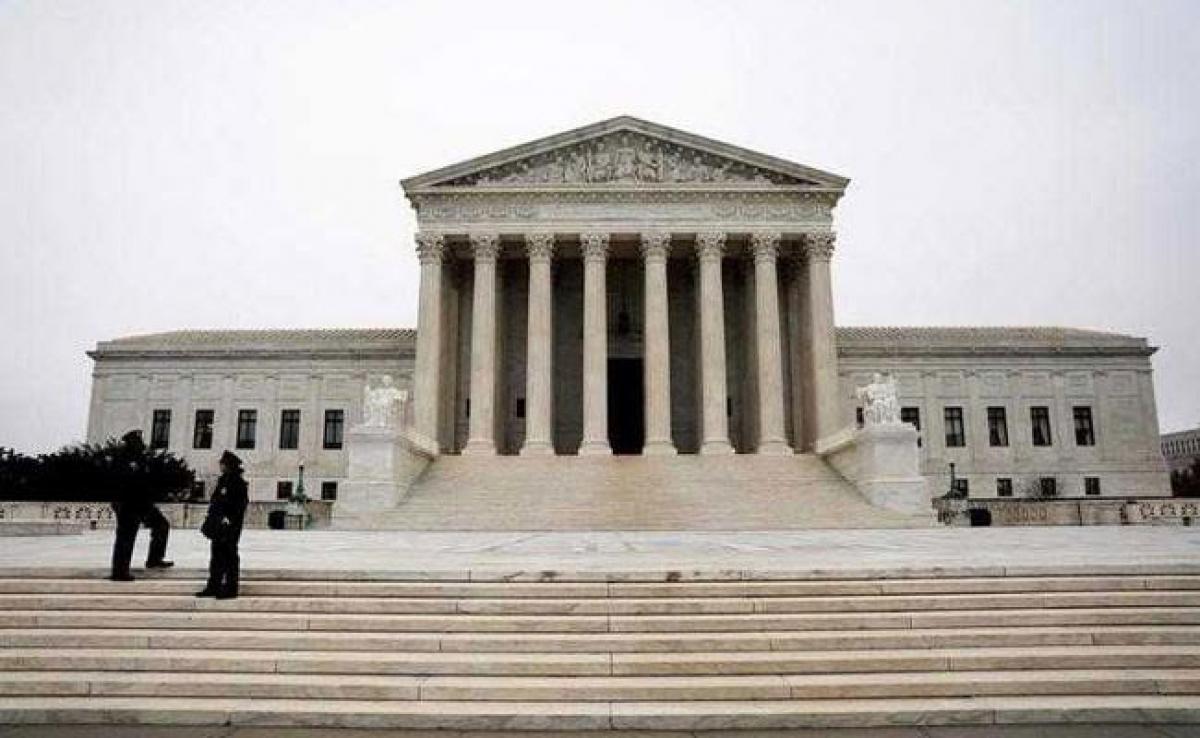Live
- Despite global odds, GDP growth at 6-7% good for India
- IIFL Home Fin to raise Rs 500 cr
- Sensex, Nifty drift lower on profit booking
- Jagan treated cadres as ‘subordinates’, alleges Grandhi
- Mpower’s survey on edu loans
- IIP growth falls to 3.5% in Oct
- Easing food prices lower retail inflation to 5.48% in November
- Space allocation for packaging units at MSME parks on anvil
- Maha Kumbh: Yogi reviews preparations
- Gadkari on accidents: I try to hide my face in meetings abroad
Just In

The US Supreme Court on Monday agreed to decide a major case on whether business owners can refuse to service gay couples if they oppose same-sex marriage on religious grounds involving a Christian baker in Colorado who declined to make a wedding cake for two men.
The US Supreme Court on Monday agreed to decide a major case on whether business owners can refuse to service gay couples if they oppose same-sex marriage on religious grounds involving a Christian baker in Colorado who declined to make a wedding cake for two men.
The court took up an appeal by Jack Phillips, a baker who runs Masterpiece Cakeshop in Lakewood, just outside Denver, of a state court ruling that his refusal violated a Colorado anti-discrimination law. Phillips contends the law violated his rights to freedom of speech and free exercise of religion under the US Constitution's First Amendment.
The dispute is one of several similar cases around the United States pressed by Christian conservatives who object to gay marriage and argue they should not be forced to violate their religious beliefs by providing certain services to same-sex couples.
The US Supreme Court's action came after Republican President Donald Trump's appointee Neil Gorsuch joined the court on April 10, restoring its 5-4 conservative majority. In prior cases, Gorsuch has embraced an expansive view of religious rights.
The court will hear the case in its next term, which begins in October.
The legal fight broke out in 2012 when Phillips told gay couple David Mullins and Charlie Craig that due to his Christian beliefs, his store's policy was to deny service to customers wanting to purchase cakes to celebrate a same-sex wedding.
The two men married in Massachusetts but wanted to celebrate their nuptials with friends in Colorado. At the time, Colorado allowed civil unions but not marriage between same-sex couples. The US Supreme Court legalized gay marriage nationwide in 2015.
Mullins described being denied service as offensive and dehumanizing. The American Civil Liberties Union in 2012 filed a complaint on behalf of Mullins and Craig, saying Phillips had violated Colorado state law barring businesses from refusing service based on race, sex, marital status or sexual orientation.
The Colorado Civil Rights Commission found that Phillips had violated the measure and ordered him to take remedial measures including comprehensive staff training and the filing of quarterly compliance reports. In August 2015, the Colorado Court of Appeals also ruled against Phillips.
The Colorado Supreme Court subsequently refused to hear the case, prompting Phillips to appeals to the US Supreme Court.
'MORE THAN A CAKE'
"This has always been about more than a cake. Businesses should not be allowed to violate the law and discriminate against us because of who we are and who we love," Mullins said on Monday.
Phillips' argument hinges in part on whether baking cakes should be classified as a creative act that touches upon his beliefs, touching on his free speech rights, or whether it is more akin to selling a product like toilet paper or shampoo. Phillips has said that if he were required to bake a wedding cake for a same-sex couple it would constitute coerced speech.
Alliance Defending Freedom, the conservative Christian legal group representing Phillips, said the lower court ruling needs to be reversed.
"It imperils everyone's freedom by crushing dissent instead of tolerating a diversity of views. We are all at risk when government is able to punish citizens like Jack just because it doesn't like how he exercises his artistic freedom," said David Cortman, the group's senior counsel.
In 2014, the Supreme Court declined to consider whether a New Mexico photography company had free speech grounds to refuse to photograph the commitment ceremony of a same-sex couple, leaving in place a ruling against the company. Such disputes in which conservative Christians who oppose gay marriage seek exemption from nondiscrimination laws increased after the Supreme Court's gay marriage decision.
Twenty-two states have anti-discrimination laws that, in some form, protect gay people.
In other so-called religious conscience cases, the Supreme Court has on two recent occasions ruled on Christian objections to the contraception coverage requirement that was part of the Obamacare health law. In 2014, the court ruled that Christian business owners could seek an exemption from the requirement.
Two years later, the court sidestepped a similar case concerning Christian nonprofit organizations. It sent the cases back to lower courts for further proceedings.

© 2024 Hyderabad Media House Limited/The Hans India. All rights reserved. Powered by hocalwire.com







